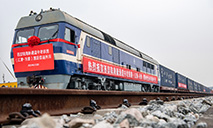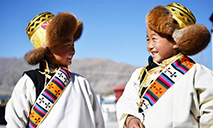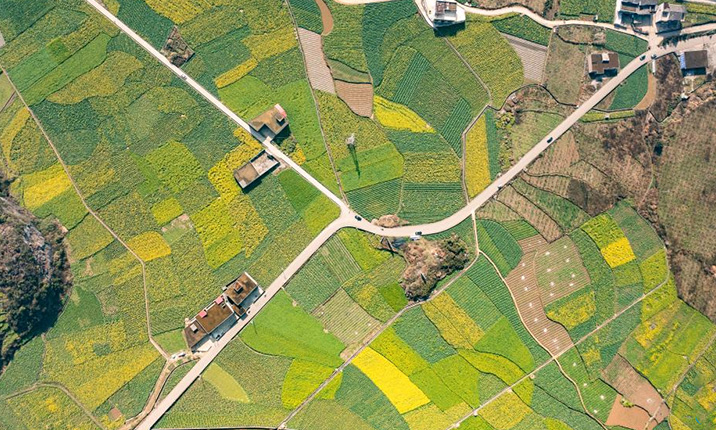Xiplomacy: Decipher China's development philosophy in Xi's "two sessions" remarks
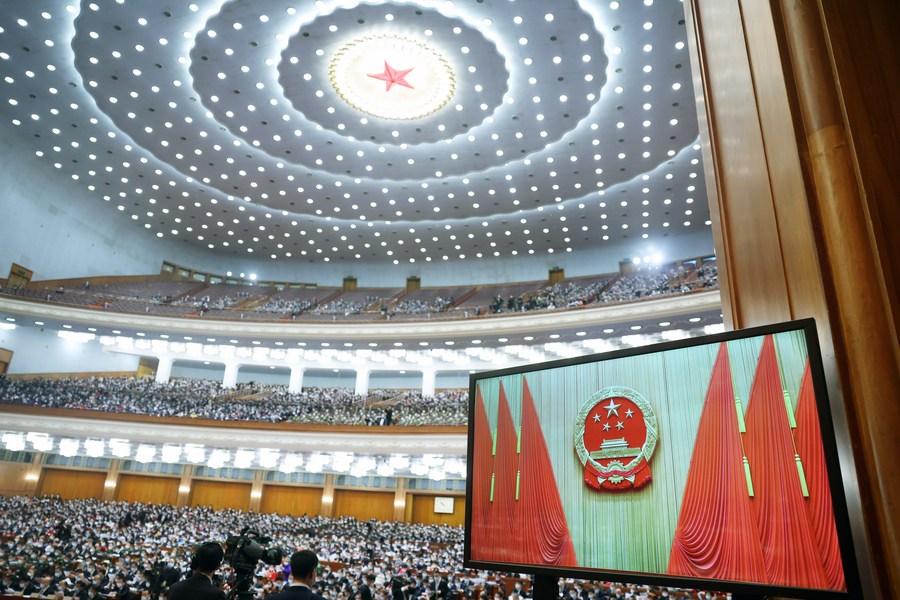
The fifth session of the 13th National People's Congress (NPC) opens at the Great Hall of the People in Beijing, capital of China, March 5, 2022. (Xinhua/Ju Peng)
BEIJING, March 5 (Xinhua) -- China's national lawmakers and political advisors have gathered in Beijing for the annual sessions of the National People's Congress (NPC) and the National Committee of the Chinese People's Political Consultative Conference (CPPCC), also known as the "two sessions."
Chinese President Xi Jinping is expected to join in discussions to set the national agenda for the year. His remarks, including those he made in the previous gatherings of the "two sessions," can offer guidance for the international community to comprehend China's development path, and have resonated with many experts across the globe.

Aerial panoramic photo taken on Dec. 19, 2021 shows China's Five-hundred-meter Aperture Spherical Radio Telescope (FAST) under maintenance in southwest China's Guizhou Province. (Xinhua/Ou Dongqu)
INNOVATION
Implementing a strategy of innovation-driven development will be fundamental in accelerating the transformation of China's growth pattern, solving deep-rooted problems concerning economic development and enhancing economic vitality, Xi said in 2013 while participating in a panel discussion with political advisors from the science and technology sector at the annual session of the CPPCC National Committee.
Speaking of innovation, Anna Malindog-Uy, a professor and researcher with Manila-based think tank Philippines-BRICS Strategic Studies, told Xinhua that China's push for high-quality innovation and entrepreneurship "is no doubt a phenomenal success," which has led to the rapid transition of China to a new economic development phase based on high-tech production and national breakthrough technologies.
Because of these steps, she noted, the Chinese economy has transitioned to a more technology-driven one, adding that the Philippines should learn from China to tap economic potential and enhance competitiveness.
Kiyoyuki Seguchi, research director at Japan's Canon Institute for Global Studies, pointed out that innovation capacity will be the driving force of China's macro-economy in the future.
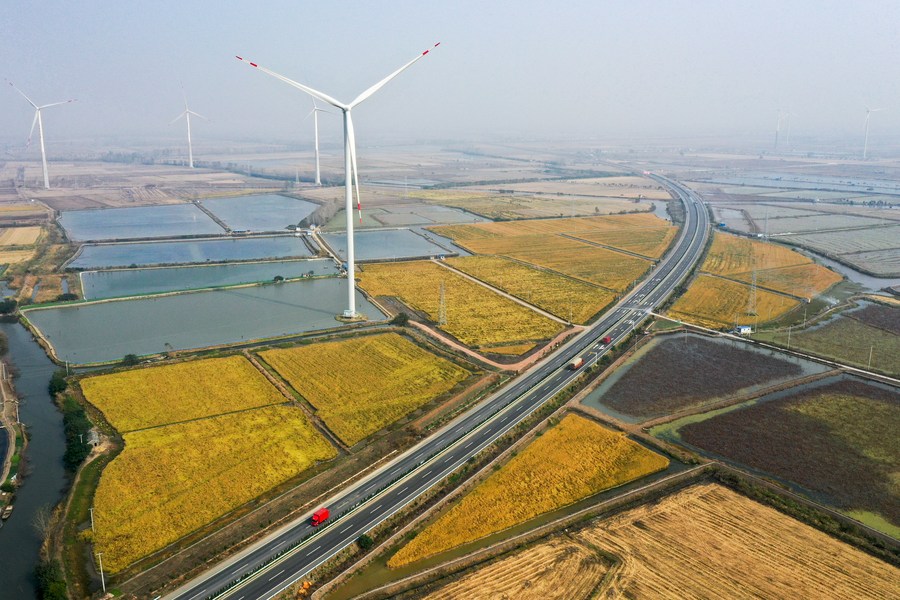
Aerial photo taken on Nov. 3, 2021 shows a wind power field in Luduo Township of Baoying County of Yangzhou, east China's Jiangsu Province. (Xinhua/Li Bo)
COORDINATED, GREEN DEVELOPMENT
In March 2021, Xi joined discussions with fellow lawmakers from northwest China's Qinghai Province, saying that local authorities should promote coordinated development between rural and urban areas, advance rural vitalization on all fronts, improve people's well-being and build a new socialist countryside that is beautiful, prosperous and harmonious.
Nadia Helmy, an assistant professor of political science at Egypt's Beni Suef University, said that China has followed a positive path in improving education, eliminating poverty and boosting development and prosperity in all provinces and cities.
The living standards of the Chinese people have improved and their rights have become better protected, Helmy observed, adding that China also shared its experience with the rest of world and made a great contribution to the international cause of human rights.
In March 2015, Xi asked the Chinese people to protect the environment as if they were "caring for one's own eyes and life," while reviewing the work report of the State Council together with national lawmakers from eastern Jiangxi Province.
"Protecting environment is ensuring livelihood," Xi stressed.
British author and political commentator Carlos Martinez said that China, as a responsible country with significant economic strength and technological capability, has ensured the Beijing Winter Olympics as the greenest games ever -- with zero-carbon venues, zero-carbon transport, low-carbon artificial snow production, and the re-use of venues.
This has set a crucial example for the world to battle climate breakdown, he added.
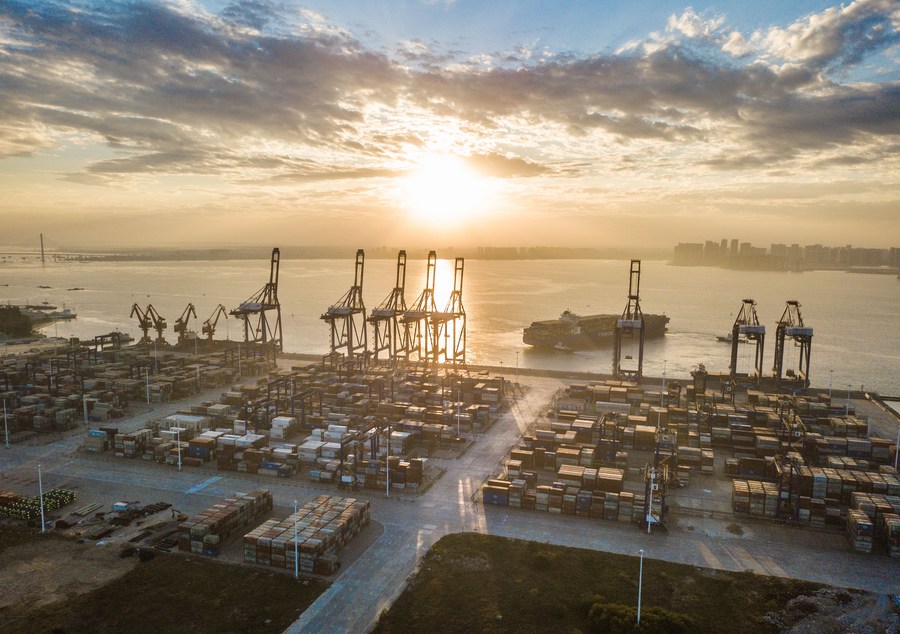
Aerial photo taken on Dec. 5, 2021 shows the sunrise scenery of the Yangpu international container port at Yangpu economic development zone in south China's Hainan Province. (Xinhua/Pu Xiaoxu)
OPENNESS
When joining a panel discussion attended by national political advisors from the economic sector in 2020, Xi called for unwavering efforts to make economic globalization more open, inclusive and balanced so that its benefits are shared by all, and to build an open world economy.
Cavince Adhere, a Kenya-based international relations scholar, said that China is a staunch supporter of multilateralism and economic globalization.
The Global Development Initiative, the Belt and Road Initiative and other initiatives proposed by China have shown that China is ready to build a new pattern of global cooperation with peace and development as its main pillars, said Adhere.
In the view of Serik Korzhumbayev, editor-in-chief of the Delovoy Kazakhstan newspaper, the international community has benefited from China's opening-up and gained experience in such fields as research and development of new technologies, information technology, industrial development and logistics.

A staff member checks vials of inactivated COVID-19 vaccine on an automated packaging line of Sinovac Life Sciences Co., Ltd. in Beijing, capital of China, Dec. 23, 2020. (Xinhua/Zhang Yuwei)
SHARED BY ALL
In a deliberation with fellow lawmakers from Inner Mongolia Autonomous Region at the third session of the 13th NPC in May 2020, Xi stressed acting on the people-centered philosophy in every aspect of work.
He also stressed adhering to "people first" in coordinating epidemic control and economic and social development.
Jose Ignacio Martinez Cortes, a researcher at the National Autonomous University of Mexico, said China reached out a helping hand in time during the critical period of the COVID-19 pandemic to Mexico and other countries.
He added that China has provided solid support to others in fighting COVID-19 and helped them tackle the pandemic and shortage of vaccines.
Humphrey Moshi, director of the Center for Chinese Studies at the University of Dar es Salaam of Tanzania, pointed out that China's success in poverty alleviation has set a good example for other countries and China's polices are practical and effective.
In particular, China's targeted poverty alleviation strategy has brought real changes to poor households, he noted, adding that developing countries, especially African countries, can learn from China's experience.
Photos
Related Stories
- Xi stresses ethnic unity, strengthening sense of community for Chinese nation
- Chinese Wisdom in Xi's Words: "It takes 10 years to forge a perfect sword"
- Xi's speech at 2022 World Economic Forum virtual session published
- Chinese Wisdom in Xi's Words: "A tiger with wings"
- Quotable Quotes: Xi Jinping on Beijing 2022
Copyright © 2022 People's Daily Online. All Rights Reserved.







